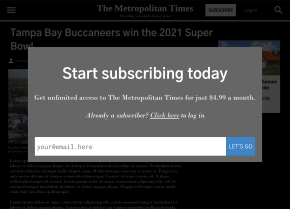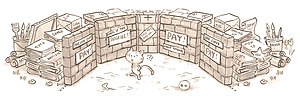
Back Betaalmuur Afrikaans جدار دفع Arabic حيط د لخلاص ARY Стена за плащане Bulgarian Mur de pagament Catalan Paywall Czech Betalingsmur Danish Paywall German Pagmuro Esperanto Muro de pago Spanish


The second wall from the left does not require the user to pay, but rather requires the user to subscribe (or register) for full access to content.
A paywall is a method of restricting access to content, with a purchase or a paid subscription, especially news.[1][2] Beginning in the mid-2010s, newspapers started implementing paywalls on their websites as a way to increase revenue after years of decline in paid print readership and advertising revenue, partly due to the use of ad blockers.[3] In academics, research papers are often subject to a paywall and are available via academic libraries that subscribe.[4][5][6]
Paywalls have also been used as a way of increasing the number of print subscribers; for example, some newspapers offer access to online content plus delivery of a Sunday print edition at a lower price than online access alone.[7] Newspaper websites such as that of The Boston Globe and The New York Times use this tactic because it increases both their online revenue and their print circulation (which in turn provides more ad revenue).[7]
- ^ Tom Felle (4 March 2016). "Are paywalls saving journalism?". City, University of London. Archived from the original on 4 April 2020. Retrieved 3 May 2017.
- ^ Joseph Lichterman (20 July 2016). "Here are 6 reasons why newspapers have dropped their paywalls". NiemanLab. Archived from the original on 21 March 2019. Retrieved 3 May 2017.
- ^ Preston, Peter (7 August 2011). "A Paywall that pays? Only in America". The Guardian. London. Archived from the original on 9 March 2021. Retrieved 22 October 2011.
- ^ McWilliams, James (12 March 2019). "Why Should Taxpayer-Funded Research Be Put Behind a Paywall?". Pacific Standard. Archived from the original on 12 May 2021. Retrieved 27 May 2021.
- ^ Sample, Ian. "Harvard University says it can’t afford journal publishers’ prices. Archived 1 October 2017 at the Wayback Machine" The Guardian 24 (2012): 2012.
- ^ "Skirting Around Paywalls: How Scientists Quickly Get the Articles They Need". 3 March 2014. Archived from the original on 25 May 2021. Retrieved 5 July 2017.
- ^ a b Rosen, Rebecca (12 September 2011). "Can a Paywall Stop Newspaper Subscribers From Canceling?". The Atlantic. Archived from the original on 8 March 2021. Retrieved 12 October 2011.